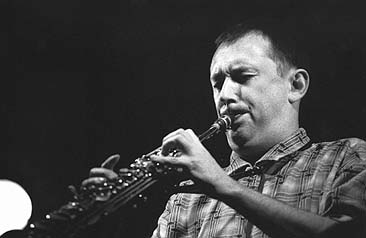John Butcher was born and raised in Brighton, England. He has been living in London since the mid 1970s. After taking classical piano lessons in school, he began playing the saxophone while he was still studying physics at Surrey University. He performed his first concert on the keyboards of Habilis, an ‘avant’ rock band. He was inspired by jazz musicians such as Stan Tracey, John Surman and Louis Moholo and began learning to play and performing in different groups, often with Chris Burn, a pianist, and sometimes with Phil Butcher, a double bass player. He began his Ph.D. in 1977 at Imperial College’s Theoretical Physics section. The paper was published as “Spin effects and weak decay in heavy Quarks” in 1982. He continued his work with Burn’s large Jazz Ensemble, winning the 1980 “BBC Big Band competition”, and toured with various projects (London Contemporary Dance Theatre. New Arts Consort. Extemporary Dance). Rehearsals and monthly concerts at Notting Hill Gate’s Workers’ Music Association were a valuable musical laboratory. Butcher published his doctorate and began to pursue music. He released the album Fonetiks (1984), and played in Jon Corbett’s Freelance with Elton Dean. Soon, he was working with guitarist John Russell as well as Phil Durrant as a violinist. To release their LP Conceits (1987), they started the label ACTA. They were joined by Paul Lovens, drummer, and Radu Malfatti in News from the Shed the year after. Butcher and Burn founded the large London Improvising Ensemble in 1985 (which later became Burn’s Ensemble). He also wrote funforall for the group’s first CD, Cultural Baggage. Other collaborations that took place in the 1980s include a soprano saxophone Quartet in Rome (with Evan Parker and Trevor Watts), a DDR tour in Italy with trombonist Alan Tomlinson and tours with the quartet Embers. There were also duos with Phil Minton and performances with Derek Bailey. Butcher also played in Bailey’s Company Weeks and released a live duet on Vortices and Angels. He collaborated with Minton on numerous projects, including the duo album – Apples of Gomorrah. Meanwhile, Minton’s quartet has toured Mouthfull of Ecstasy with texts from Finnegans wake – all over Europe. In 1991, Georg Grawe formed the group Frisque Concordance. While in London, he joined the final version John Stevens’ Spontaneous Music Ensemble (with Roger Smith). The last recorded concert of the SME is found in A New Distance. Other new projects around this time included duos with the singer Vanessa Mackness, and the multi-instrumentalist Steve Beresford. Butcher first toured Canada in 1993 with the Grubenklang Orchestra and the next year with News from the Shed. Recordings and solo concerts have been a passion of Butcher’s for a long time. Thirteen Friendly Numbers (1991), his first solo CD, features pieces for multitracked Saxophones. London, Cologne, and Fixations focuses on live performance. Invisible Ear (2003) explores close-miking and multitracking. Cavern with Nightlife also includes a concert in the huge Japanese Oya Stone mountain. The Geometry of Sentiment (2007) is a collection of pieces taken from European and Japanese concerts. This concern was brought to his attention during the 2006 Resonant Spaces Tour of Scotland and Orkneys. This tour’s music is collected on the Resonant Spaces CD. Butcher was influenced by electronic music early in his saxophone playing. This became clear in Secret Measures, which he formed with Phil Durrant in 1997. He also joined the electro-acoustic Austrian band Polwechsel in the same year. They have released six CDs, including collaborations with Christian Fennez and John Tilbury. He also collaborates with Christof Kurzmann, an Austrian lloopp/laptop musician. He has enjoyed three trips to Japan, where he was able to record and play with Toshimaru Nakamura, a no-input mixer specialist. Butcher is particularly interested in the possibilities of amplifying his sound. He forms the trio Thermal with Andy Moor, EX guitarist, and Thomas Lehn, synthist. With William Tsun-Yuk Hsu, a Californian computer professor, he has spent time at ZKM and STEIM helping to research a software system that can recognize his saxophone technique. He collaborated with Newton Armstrong, Princeton University in 2004 on interactive saxophone/electronic Feedback manipulation. His wind trio, The Contest of Pleasures with Axel Dorner, and Xavier Charles has been described by some commentators as electronic music performed on acoustic instruments. The “Contest of More Pleasures” adds sound manipulators Jean Pallendre and Laurent Sassi to further explore the acoustic/electronic/real-time/recorded conundrum. Collaborations with North American musicians began with the Vancouver Jazz Festival. Particularly duos with Gino Robair and Gerry Hemingway, drummers, and a trio featuring Torsten Muller, Vancouver residents.
